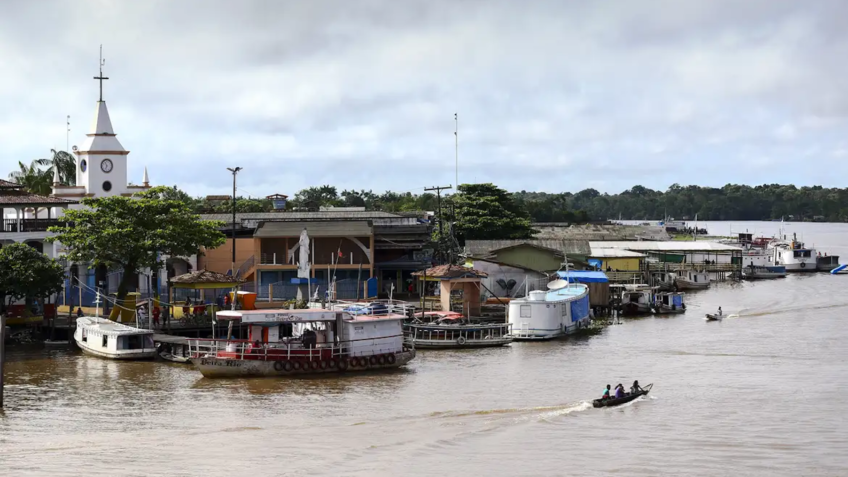
On February 22, pre-candidate for Mayor of São Paulo Tabata Amaral posted a video on her social networks with an appeal. “In recent days, much has been said about the sad reality of child sexual exploitation and child trafficking that takes place on the island of Marajó”she says.
Looking into the camera, the image of the serious face is interspersed with scenes of children on boats with their faces blurred to avoid identification, as if they were victims of a crime. “There are many reasons why we cannot make progress in combating child sexual exploitation. One of those reasons is silence, it’s taboo.”she says. “We must break this silence”complete.
What happens on Marajó Island, unfortunately, is not an isolated case. It’s about all the children who are victims of absurd crimes caused by poverty and abandonment in Brazil! Breaking the silence on this issue and protecting our children needs to be a commitment from all of us. pic.twitter.com/XJy28RbHYu
— Tabata Amaral (@tabataamaralsp) February 22, 2024
It is intriguing that Tabata talks about breaking the silence, considering that she acted as a deaf-mute during the entire time that then minister Damares Alves made this problem a flag. Damares was not just ignored – she was incessantly mocked, an easy punching bag in a government used by the media as a target for ridicule and hatred, Bolsonaro as the Emmanuel Goldstein of an increasingly hysterical and irrelevant press.
But it’s easy to understand why Tabata decided to get on the Marajoara ferry – because family matters will be his political platform shoes.
“Women’s rights”, “education” and “mental health” are 3 of the 6 items that Tabata lists on her profile on X (formerly Twitter) as government projects. In this list of topics, Tabata does not reveal her position. Without making a promise, the list contains only a threat – the threat that, as mayor, she will get involved in all these matters.
Tabata is known for intruding into orifices where she wasn’t called out. One of them was named “menstrual poverty”, a hole from which a lot of public money would flow to a few private companies. In 2022, the year in which the project began to be implemented, the government estimated to spend around R$140 million in taxes on the purchase of sanitary napkins in 2023 and 2024 – money that would be absorbed by friends in power.
Tabata was the congresswoman most engaged in the fight against this enemy that until then no one knew about. “Menstrual poverty” – see how interesting, dear reader – was an evil that emerged simultaneously in Brazil and Scotland, countries with completely different socioeconomic profiles. I talk a little about this “coincidence” in the article “Mental poverty and collective bleeding”.
When the project was approved, I didn’t see any spontaneous demonstrations by girls, but I saw the effusive celebration of Always, a manufacturer of sanitary pads. After that gesture of unrestrained enthusiasm, I asked the company at X if it would be one of the companies receiving my taxes:
“Good morning, Always. Will you be one of the companies awarded public funds for this strange priority? And what is the increase in revenue by selling millions of pads to a single customer? AND @tabataamaralsp you will receive campaign financing from any company involved?”
Always’s reaction was revealing: instead of responding to me, she preferred to delete the tweet celebrating the commercial victory, I mean, humanitarian victory. Luckily, one of my readers saved the print.
Damares Alves did not miss the chance to get on this stage, and also celebrated the approval of the project at X:
“For this year, 23 million reais will be invested and for next year the separate amount is already 140 million reais. Among the Program’s numerous actions is the distribution of sanitary pads to more than 3 million women and teenagers. It’s the Government taking care of women.”
This is where I’m going to have to tell Tabata that she arrived late on the ferry, because she’s unlikely to be as good as Damares – which means she’s unlikely to be as bad, to be clear. Damares deserves my dishonorable mention because, for the tragedy of thinking beings, and for the chagrin silent of Bolsonaro supporters, the then minister did what no purple-haired identity could have done: Damares managed to criminalize relations between men and women once and for all, or what the women’s magazine Marie Claire called it “an important advance in the country’s gender violence policy”.
In a discreetly celebratory tone, the report says that “psychological violence against women is now a crime in Brazil”. It also states that, with law 14,188 of 2021, “a range of violence committed against women is now recognized and included in the Penal Code, with the right to a prison sentence of 6 months to 2 years”.
Did you notice how cute the writing was? Marie Claire? “With the right to a sentence of imprisonment”. Yes, paradoxically this mistake was a success, because the woman conquered the right to invent an excuse to put a man in jail even for a verbal insult. That’s right: with the law that made Damares declare the Bolsonaro government as “the pinkest in history”a woman can recognize herself as a complete idiot, and as soon as her weakness is properly established and admitted, she can send to jail any man who has merely ridiculed her.
As the text of the law on the government website explains, the law “changes the type of penalty for simple bodily harm committed against women for reasons of the female sex and creates the criminal type of psychological violence against women”.
As this article tells, a man can face a sentence of up to 2 years in prison and a fine if “cause emotional harm to a woman that harms her and disrupts her full development or that aims to degrade or control her actions, behaviors, beliefs and decisions, through threat, embarrassment, humiliation, manipulation, isolation, blackmail, ridicule, limitation of the right to coming and going or any other means that harms your psychological health and self-determination.”.
Men and women are indeed different, and anyone who uses the right organ when thinking can understand this. But if Damares had truly intended to empower women, she would have suggested ways to equalize us with men in the balance of physical power, the one in which we are at a disadvantage.
To this end, laws could have been created that facilitated women’s access to carrying weapons, or that provided free krav maga classes to girls, instead of sanitary pads. But law 14,188 did exactly the opposite of empowerment: it established the disempowerment of women by decree. From his perspective, men will always be superior to women, because they will always be in a condition of inferiority – including psychologically.
Returning to pedophilia, it wasn’t just Tabata who suddenly woke up to the subject, although she curiously chose not to mention the word (which, as I showed last week, for the Rede Globo it’s just one “illness” that can be treated “like diabetes”). Angelica also spoke out; Juliette and other celebrities, all duly managed, suddenly began to worry about rape and child trafficking – but all specifically mentioning Marajó’s case.
Could it be that in the Marajó archipelago there are many more children suffering sexual abuse than in the rest of Brazil? I don’t know if a tragedy of this scale is exclusive to the archipelago, but some things are exclusive to that region: on the one hand, one of the worst socioeconomic indexes in the world; on the other, an unusual wealth of minerals, fossil fuels and one of the largest herds of sea buffalo on the planet, a meat superior to beef.
The Marajó archipelago is the largest group of river islands in the world, and is close to Guyana, a country where part of poverty is being eliminated by money coming from oil exploration. “Oil money is flooding into Guyana”says the Reuters. “Exxon will invest R$46.1 billion in offshore project in Guyana”tell to Forbes.
“A lot of people say that Guyana will be the next Abu Dhabi”says Adriano Pires, energy specialist and columnist for this Poder360. In an interview for this article, Adriano further stated:
“I joke that Guyana’s oil is across the street. That entire area of Foz do Amazonas – which includes the Marajó archipelago – is a region that has huge potential. To give you an idea, Guyana alone has already discovered something like 11 billion barrels of oil reserves. For comparison, the pre-salt has around 14 to 15 billion barrels in reserves.
“That is an area of great interest, both in ore, bauxite, gold, and now oil. We have been advocating that Ibama grant a license to explore oil in Foz do Amazonas. It makes no sense that the population there in Arco Norte, which goes from Rio Grande do Norte to Amapá, does not benefit from oil exploration – which creates a lot of jobs, payment of royalties, etc.
“That could completely change the socioeconomic situation of the region, I have no doubt about it. The territory of Amapá is almost 75% APA – an environmental protection area. But if you look at the state’s socioeconomic indexes, it is one of the worst in Brazil.”
Source: https://www.poder360.com.br/opiniao/o-marajo-a-protecao-da-natureza-e-a-desprotecao-da-gente/

